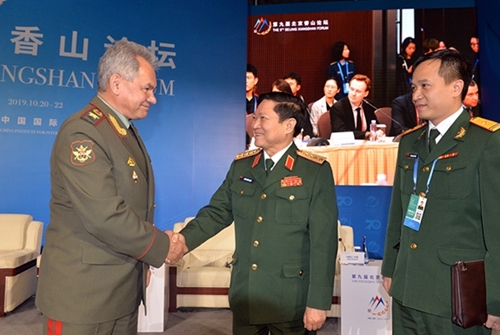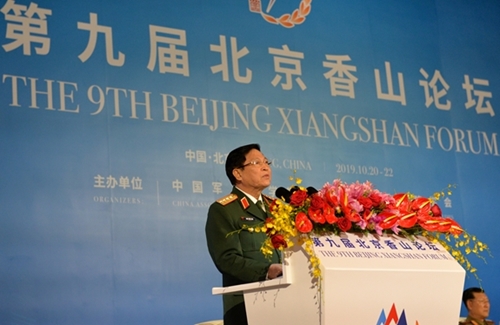This year’s forum, themed “Maintaining International Order and Promoting Peace in the Asia-Pacific,” has attracted hundreds of defense and military leaders, along with scholars and observers from countries and organizations around the world.
The forum consists of four plenary sessions, namely relations among major powers and world order, security risk management in the Asia-Pacific region, the interests of small- and medium-sized countries and common security, and international mechanisms on arms control and global security. Additionally, there are also eight panel discussions on various international issues, such as measures to build strategic confidence, Asia-Pacific security architecture, and fast change in maritime security.
    |
 |
|
General Ngo Xuan Lich (R) and Russian Minister of Defense Sergey Shoigu (L) |
In his congratulatory message sent to the forum, Chinese Party General Secretary and President Xi Jinping stated that China is determined to promote regional peace and development via dialogue and cooperation. The Chinese President added, threats to security have now become more complicated, so countries have to stand united, respect international law and seek solutions to any differences and disputes via dialogue, thus contributing to resolving common security threats, and promoting regional peace and development.
At the opening session on October 21, Senior Lieutenant General Wei Fenghe, Chinese Defense Minister, made a keynote speech, introducing China’s defense policy, under which China prioritizes dialogue and negotiation in addressing differences and disputes with other countries. According to him, existing cooperation mechanisms should be strengthened while countries should join efforts to build a community of common interest as well as team up to handle traditional and non-traditional security challenges. He also underscored that China is willing to enhance strategic mutual trust and security cooperation with all other countries in the Asia-Pacific region.
Addressing the first plenary session themed “Relations among major powers and world order,” Vice Secretary General of ASEAN Hoang Anh Tuan clarified ASEAN’s views on relations among major powers, world order and regional security situations. He stated that leaders of the ASEAN member nations have approved the bloc’s position on the Indo-Pacific region. Accordingly, ASEAN comprehends that regional peace, stability and prosperity will only be maintained and promoted when all regional countries strive for these goals. This means, he explained, healthy relations among major powers play a crucial role in promoting a peaceful and stable environment in the region. ASEAN always prefers peace to conflicts, cooperation to confrontation. To this end, ASEAN will try to foster cooperation with major powers.
    |
 |
|
General Lich speaking at the event |
At the second plenary session themed “Security risk management in the Asia-Pacific region,” Vietnamese Defense Minister, General Ngo Xuan Lich delivered remarks, expressing Vietnam’s viewpoints on security and development issues in the region and world.
He said there are many complex and unpredictable factors in the political and security environment in the region, which poses a number of both traditional and non-traditional security challenges and risks.
To well manage security risks in the Asia-Pacific region, General Lich suggested countries should uphold the rule of law and mutual respect in international relations as well as in the settlement of differences and disputes. Major powers should enhance their sense of responsibility while all countries should promote the role and efficiency of bilateral and multilateral cooperation mechanisms in building trust and managing security in the region. Finally, countries should seek peaceful means for settling disputes by promoting a partnership spirit and responsible manners towards the community.
“I put a special emphasis on mutual respect and respect for international law in relations among countries. In other words, countries should respect each other and honor international law in international relations as well as in solving differences and disputes between and among them. Countries should also strictly observe the UN Charter, resolutions of the UN Security Council, multilateral cooperation mechanisms, including ASEAN Defense Ministers' Meeting Plus (ADMM+). On the one hand, these regulations help maintain impartiality, equality in relations between countries as well as in settling differences or disputes between and among countries. On the other hand, they promote a civilized and developed world without imposition and coercion,” General Lich underscored.
Regarding the situation in the East Sea (South China Sea), General Lich said this area faces various security risks due to the impact of many factors, including competition among powers, sovereignty disputes, and non-traditional security issues.
The East Sea situation is still a developing complication. If it is not successfully resolved, regional peace and stability may be negatively affected; trust among countries may be undermined; and regional cooperation efforts may be hindered, he said.
General Lich explained that Vietnam always supports and protects the freedom of passage, security and safety of navigation and aviation in the East Sea based on international law.
Vietnam persistently pursues its policy of resolving the East Sea issue by peaceful means in line with international law and practice, particularly the 1982 United Nations Convention on the Law of the Sea, he stated.
“The East Sea issue must be handled by peaceful means based on international law. Involved parties should not resort to the use of force or threaten to use force against others and respect legitimate interests of each country in the partnership spirit and in a responsible manner towards the community. Vietnam is committed to promoting cooperation with other countries to build the East Sea as a sub-region of peace, stability and development, for the sake of all countries inside and outside the region,” General affirmed.
He said that the security and stability of China and ASEAN countries are inseparable. Thus the two sides have always respected and fostered cooperation in all fields, including the defense and security sphere, which has been an important pillar.
Vietnam has recognized China’s efforts in promoting regional cooperation and development, and fostering the settlement of global and regional security issues. Vietnam has also highly appreciated China’s contributions to strengthening the ASEAN-led regional cooperation mechanisms and realizing the two sides’ proposals and initiatives to maintain a peaceful and stable environment for the sake of each country and the region as a whole, General Lich lauded.
He also suggested that outstanding issues in the relations between Vietnam and China be persistently tackled in the spirit of equality and mutual respect, on the basis of the two countries’ traditional solidarity and friendship and in line with the agreements reached by the two countries’ leaders, meeting the two peoples’ aspirations and contributing to regional peace, stability and development.
General Lich also proposed that ASEAN and its partners build a strategic vision on security in the Asia-Pacific, which can serve as guidance for the framework and objectives of regional cooperation in the future, for an Asia-Pacific region of peace, stability, friendship and prosperity.
The Vietnamese Defense Minister took the chance to inform that Vietnam will become the Chairman of ASEAN and a non-permanent member of the UN Security Council in 2020. He called on all countries to support Vietnam in successfully fulfilling its missions and contributing positively to the region and world.
The 9th Beijing Xiangshan Forum has been scheduled to close on October 22.
Reported by Thu Trang from Beijing, China
Translated by Thu Nguyen